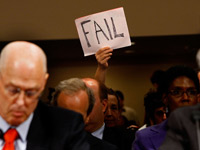
Having looked at the semantic change of
fail yesterday, I had a look at some more language articles on Slate and found
this excellent one about the word
pimp. Again, it's a word that's gone through an interesting process of semantic change, ameliorating into something with quite approving connotations and shifting its grammatical function from noun to verb, as well as broadening to encompass an almost entirely new set of meanings.
As the Slate article points out, the original meaning of pimp appears to be as a noun referring to a person (usually) male who solicits customers for prostitutes in return for a share of their money (from
Dictionary.com).
Etmology online suggests a possible origin for the term as the verb
pimper from French meaning "to dress elegantly" or
pimpreneau from French meaning "a knave, rascall, varlet, scoundrell" (ie a bad person). So far so good... or bad depending on whether you're the unfortunate prostitute renting out body parts to desperate men or the elegantly dressed arranger of the liaisons.
But as Slate goes on to discuss, the word has semantically shifted more significantly over recent decades:
But the word has seen a renaissance of sorts, with a strong increase in use in recent years. Media attention to (and glamorization of) the stereotype of the inner-city pimp brought such terms as pimpmobile and pimp walk—an ostentatious swagger affected chiefly by African-American men—to public attention in the 1970s. More recently, we've seen the advent of a range of benign figurative uses. We can now pimp our possessions, making them flashily decorated or customized, a use mainstreamed by MTV's car-detailing show, Pimp My Ride. An attractive or appealing man may be called a pimp, and this is viewed as a positive description. To describe something using the accolade pimping is to mark it as wonderful or exciting. Jay-Z's 2001 hit "Big Pimpin'" used the term as shorthand for a livin'-large lifestyle.
So, a more modern meaning of pimp appears to be as a term of approval for a sexually successful man (in the same way that stud, playa, cassanova, romeo have all been used too) , but the term has broadened in its verbal form to take in anything that is enhanced or made more attractive. But is this a good thing? Can we ever really say that language change is good or bad? (For a brief digression, have a look at
this post on Language Log if you want to explore the idea of change being good, bad or just neutral.)
Some people, used to the older meaning of pimp as an immoral and uncaring man making money out of a woman's exploitation, object to the amelioration of the term. It's not a difficult point to understand: if the word pimp is used positively, does it now mean that the whole idea of pimping is seen more favourably? That it's ok to sell women's bodies? Or does it just mean that the word has changed and has little to do with its original meanings? Slate writer Jesse Sheidlower goes on to say:
Many younger speakers find these uses neutral and unobjectionable. Many older speakers think that any positive use of pimp is sexist or demeaning. But you can't make someone feel a certain way about a word. Younger people will continue to use suck ("to be notably bad") or gay ("lame, boring, terrible, stupid") heedless of what their elders think; it's just as hard to get people to reject something they think is OK as to get people to accept something they've been taught is wrong. (Though it's interesting to observe the online trend of writing the pejorative sense of gay as "ghey," to explicitly disassociate it from the homosexual sense.)
So, pimp, pimping, to pimp... what does it mean to you?
Useful for: ENA5 - Language Change ENGA2 - Investigating Representations ENGA3 - Language Explorations





